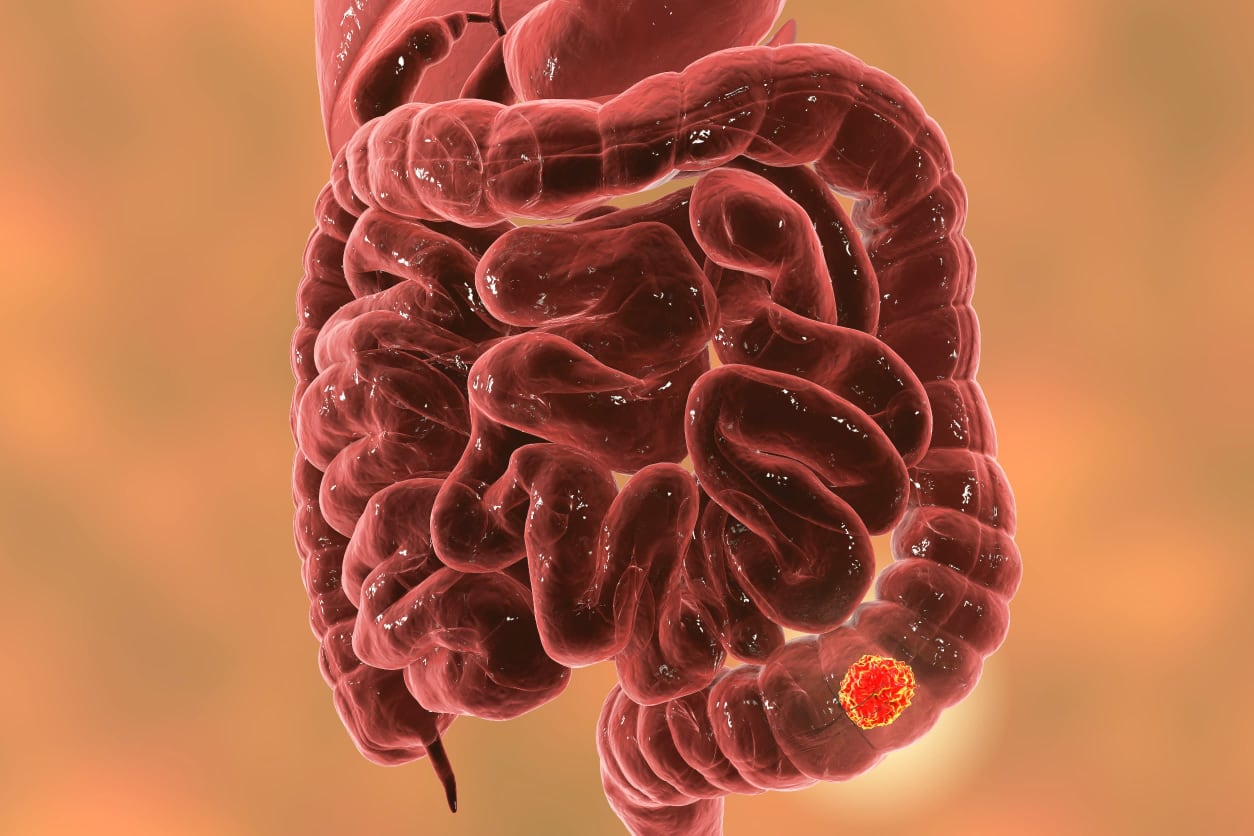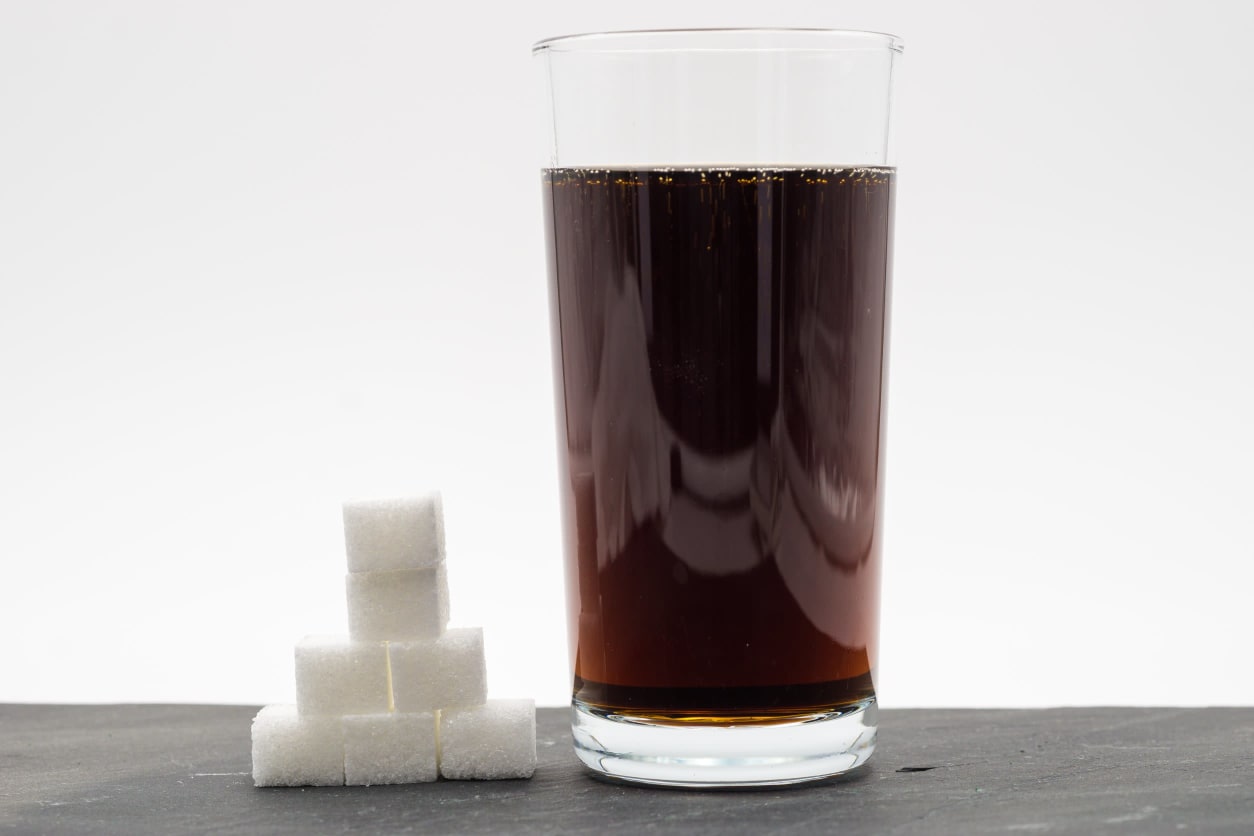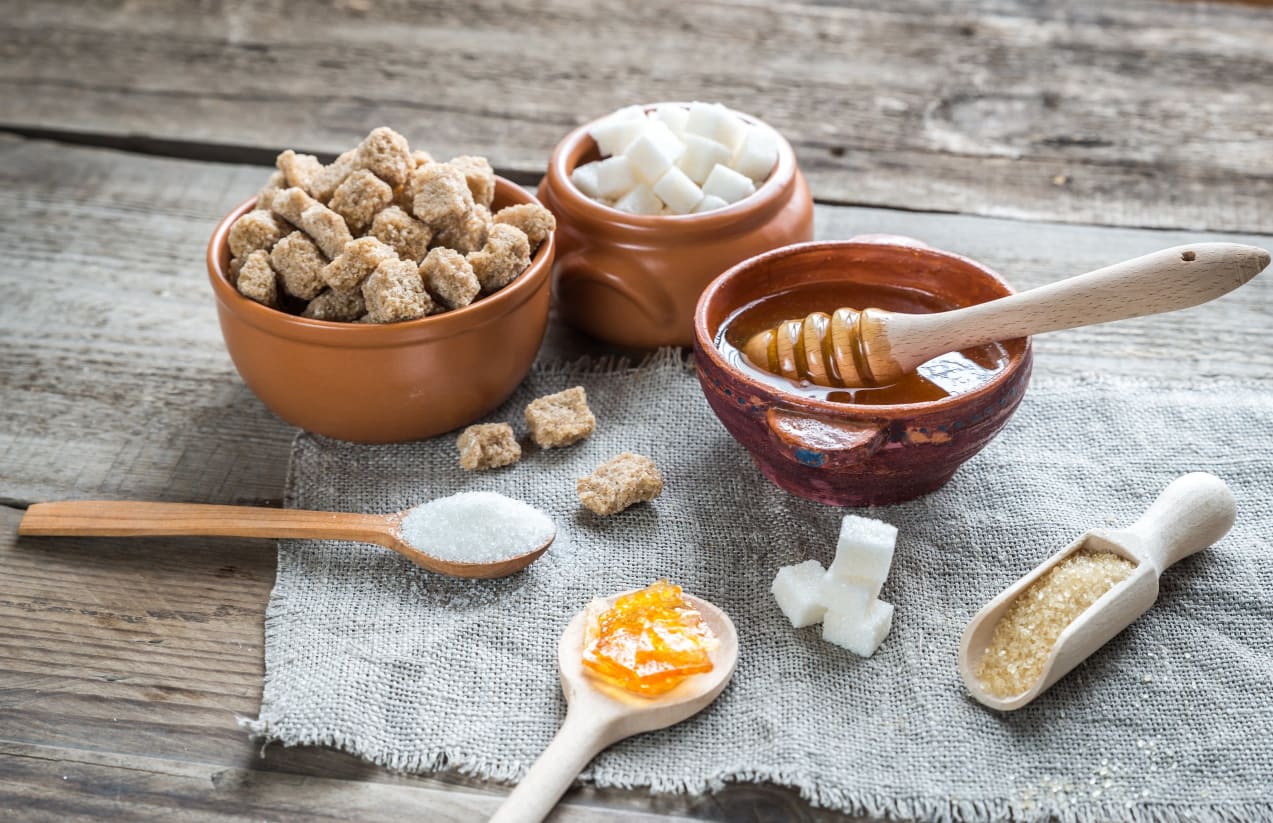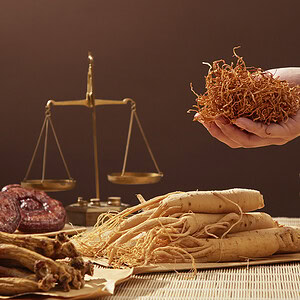Dame Deborah James recently passed away from bowel cancer at the age of 40.
She campaigned tirelessly to raise awareness for the disease, and in her honour much of the media has turned its attention towards how to spot signs of bowel cancer.
Here at Optimum Nutrition, we want to look at ways to prevent the disease. While we’ve never done a comprehensive breakdown of all potential risk factors associated with bowel cancer, in 2019 we examined some new research about one in particular.
High fructose corn syrup is an ingredient commonly found in sugary drinks, and some studies suggest it could accelerate the growth of tumours in the bowel.
The following extract has been adapted from the summer 2019 issue of Optimum Nutrition magazine.
We think that liquid form[s] of sugar, either sucrose or HFCS, can be more dangerous than foods made with sugar – e.g. cookie, cake, etc. – regarding the growth of the colon tumour

Researchers at Baylor College of Medicine and Weill Cornell Medicine, USA, have found that modest amounts of high fructose corn syrup (HFCS) – a common ingredient in fizzy drinks – speeds up the growth of intestinal tumours.
The study, published in Science, found that HFCS given to mice through sweetened water accelerated tumour growth.
Although observational studies have linked drinking sugary drinks with bowel cancer (also known as colorectal cancer or CRC), it had not been clear whether drinking sugary drinks actually caused or contributed to the disease.
The authors also said that previous studies had tended to focus on either fructose or glucose, but that sugary drinks contained both. HFCS comprises fructose and glucose at a 55:45 ratio.
The effects on early stage tumours
To investigate the possible effects of HFCS, the team first generated a mouse model of early-stage colon cancer.
Co-corresponding author Dr Jihye Yun said: “APC is a gatekeeper in colorectal cancer. Deleting this protein is like removing the breaks of a car.
“Without it, normal intestinal cells neither stop growing nor die, forming early stage tumours called polyps. More than 90% of colorectal cancer patients have this type of APC mutation.”
The mice were given controlled amounts of sweetened water, to mimic human consumption of one fizzy drink per day.
After two months, they had developed larger and higher-grade tumours than mice that had been given regular water.
Yun said the results suggested that when the animals had early stage tumours in the intestines, consuming even modest amounts of HFCS in liquid form “can boost tumour growth and progression independently of obesity.”
She added that although further research was needed, the findings in animal models suggested that “chronic consumption of sugary drinks can shorten the time it takes cancer to develop”.
In humans, it usually takes 20 to 30 years for bowel cancer to grow from early stage benign tumours to aggressive cancers.
“This observation in animal models might explain why increased consumption of sweet drinks and other foods with high sugar content over the past 30 years is correlating with an increase in colorectal cancers in 25 to 50 year olds in the United States,” said co-corresponding author Dr Lewis Cantley.

Fuelling bowel cancer
The researchers found that the sweetened water increased levels of fructose and glucose in both the colon and blood, so tumours could take them up through different routes.
The fructose underwent a chemical change that enabled it to promote production of fatty acids, which ultimately contribute to tumour growth.
Dr Cantley said that the study revealed that cancers utilised HFCS as fuel.
“While many studies have correlated increased rates of colorectal cancer with diet, this study shows a direct molecular mechanism for the correlation between consumption of sugar and colorectal cancer,” he said.
Does sugar cause bowel cancer?
Currently, it is not known whether the findings would also apply to sucrose, commonly known as table sugar.
Unlike HFCS, sucrose consists of fructose and glucose at a 50:50 ratio.
Speaking to Optimum Nutrition, Dr Yun said: “I think that sucrose is equally bad as HFCS with the similar mechanism.”
Yun said the team had found that the fructose concentration in the small intestine and the colon was equally high when mice were orally treated with sucrose, compared with when they were treated orally with HFCS.
“Thus, sucrose and HFCS are almost [the] same in terms of biological effects,” she said. “This means that we should avoid liquid with sucrose including all sugary juice as well as liquid with HFCS.”
Yun added: “We think that liquid form[s] of sugar, either sucrose or HFCS, can be more dangerous than foods made with sugar – e.g. cookie, cake, etc. – regarding the growth of the colon tumour.”
This, she said, was because sugar in liquid form had the high concentration of non-liquid sugar but without “much other stuff [i.e. food ingredients] which will easily saturate the fructose transporter in the small intestine”.
But, she added, eating too much sugar in foods should also be avoided because of its contribution to obesity and other chronic diseases.
Yun said the team hoped that restricting sugary drinks would be beneficial to people who are genetically predisposed to develop colon tumours (APC), and also to those who don’t have the genetic predisposition of APC mutation.

Rising rates of bowel cancer
Shortly after the HFCS study was published, two separate studies were published reporting an increase in bowel cancer among young people.
One study published in Gut, which had used data from 143.7 million aged 20 to 49 from 20 countries, revealed that whilst bowel cancer is rising in Europe among adults aged 20 to 49, the fastest rise had been observed among younger adults aged 20 to 29.
Incidence of bowel cancer rose significantly among the 20 to 39 age group in 12 European countries, including the UK. Italy, however, showed a decrease in cases.
Incidence rose significantly in the 40 to 49 age group in eight countries, including the UK, but rates fell significantly in the Czech Republic.
The authors highlighted some limitations in their research, included the variability of data between countries and other factors that may be behind these trends, including the rise in obesity, and lifestyle factors such as lack of physical activity, alcohol intake, and smoking.
In a separate study published in The Lancet Gastroenterology & Hepatology, it was reported that bowel cancer incidence is on the rise among young adults in several high-income countries.
The observational study of data from 21 population based registries in Australia, Canada, Denmark, Ireland, New Zealand and the UK found that between 2004 and 2014, the incidence of bowel cancer in people aged 0 to 49 years increased significantly each year.
What to eat to reduce the risk of bowel cancer
A diet that is rich in fibre and low in processed and red meat is currently recommended to reduce the risk of bowel cancer.
Eat a variety of vegetables and fruit, and wholegrains such as oats, brown rice, quinoa, rye and whole wheat.
If you are worried about bowel cancer, seek advice from your GP. Further information can be found on the NHS website.
Enjoyed this article?
Learn about PCOS and how nutrition can help
For articles and recipes subscribe to Optimum Nutrition
Discover our courses in nutrition






